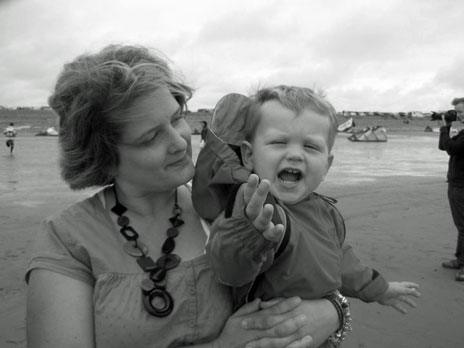Should everybody get paid bereavement leave?
- Published

Losing a relative or a loved one can be a devastating time. Yet a bereaved parent, son or daughter might only get three days off work to grieve. So should employees be entitled to paid bereavement leave?
When John's father died in his arms 18 months ago, he was devastated. But after a few days off, he felt like his bosses pressured him into returning to work.
Even when a doctor signed him off because he wasn't coping, his wife says they regularly called to push him into coming back, before disciplining him for lack of attendance.
He believes the extra stress at such a difficult time caused him to have a breakdown.
There is currently no legal requirement for employers to provide paid leave to those in mourning.
Workers have a right to "reasonable" time off after an "emergency involving a dependant". A government website, external suggests that often "one or two days should be enough".
Often this is used to arrange or attend funerals.
But the length and pay status of the time off depends on the employee's contract and the discretion of the employer. Typically, bereavement leave - also known as compassionate leave - is about three to five days.
Grieving workers would then have to eat into their holiday allocation or get signed off sick.
Considering parents get paid maternity and paternity leave - which can be up to a year in the case of maternity - some argue it's unfair that grief-stricken parents are not afforded similar legislative rights.

Lucy Herd with her son Jack, who died in 2010
Lucy Herd lost her 23-month-old son Jack in August 2010. Although she was not working, her then partner got only five days of bereavement leave.
"I was utterly shocked - I just assumed that if you got time off for the birth of your child you would automatically be entitled to time off to bury your child and not have to worry about going back to work so soon.
"It's crazy that there's no legislation," she says.
Herd, who has been campaigning to change the law since Jack died, says that the lack of legislation leaves employees at the mercy of their bosses.
"One lady I met had lost her father and took her five days off, and within three months her mother had died. The company told her she had already used her bereavement entitlement and was expected to come back to work," she says.
Another man, a builder, lost his daughter to sudden infant death syndrome and was expected back five days later, she adds.
"He was not ready to return as he hadn't slept properly [but] he had to because he was told if he didn't he'd lose his job."
Another bereaved mother, Mary, recalls how her husband Phil was given three days off after the death of their four-year-old son. The funeral was on the fourth day, meaning Phil had to use up his paid holiday leave just to attend. "He then had to be signed off [a few days later] by his GP as he wasn't allowed to take consecutive holidays," she says.
Many companies and bosses do act with compassion.
Herd knows one lady who was given nine months off after the death of her son and is still allowed to work at her own pace.
"If everyone had natural compassion that would be lovely," she says, but points to her campaign as evidence this is not the case.
Yet while there is consensus about the importance of maternity - and even paternity - leave, bereavement leave has seemingly failed to strike the same chord.
And it seems the business world has little appetite for more legislation.
"I do not believe it is necessary to add this to the weight of existing employment regulation," says Jane Gratton, deputy chief executive at the North Staffordshire Chamber of Commerce.
"Small businesses are disproportionately affected by the impact of staff absenteeism and productivity can suffer if the staff member is absent for an extended period."
Jeremy Harris, who runs a small printing business, offered one worker unlimited paid leave after his wife died. To dock his pay would have felt too cruel at such a time, he says.
But Harris recalls that during the month his worker took off, the company had to pay other people to cover the hours - effectively paying twice.
Not all small businesses have either the inclination or the capacity to do this.
"However, it is in the employer's interest that staff who come to work are properly fit to do so," says Gratton.
"When a member of staff has suffered a bereavement, employers will want to show compassion," agrees Guy Bailey, head of employment and employee relations at the Confederation of British Industry (CBI).
"The right solution is the one that works for the individual. That can vary from person to person," says Bailey, explaining why he opposes inflexible regulation.

Of course bereavement affects some people for the rest of their lives and others not at all.
Some people need to get back to work immediately and avoid isolation at home, says counselling psychologist Emmy van Deurzen.
"It's important that people feel they are needed," she says.
More than two weeks' bereavement leave would be excessive and potentially even dangerous, she adds. "It would be encouraging a collapse into bereavement."
Much depends on the work environment that people are reintroduced to.
"If you work in a harsh environment, where you have to suppress it all, it starts festering and then turns into longer-term problems," she says.
There's also the consideration of whose death would qualify for bereavement leave.
Some people are more affected by the loss of a pet than a distant relative. For others a guardian may have meant more to them than their parents.
"One reason for not creating a bereavement leave entitlement is that individuals take different periods of time to grieve after the death of a loved one," says a government spokeswoman.
"Time for maternity [or] paternity leave can be predicted while bereavement leave is dependent on the context and individual - this cannot be legislated for," she continues, adding that suitable periods of leave should be agreed between employers and employees.
Employment lawyer Sharon Auld thinks that defining the limits would be tricky. "How many days, who is included? It's so subjective, how can you put the timings on it?"
Auld adds that the majority of employers use discretion compassionately anyway.
But the Trades Union Congress (TUC) says there should be a statutory minimum of paid bereavement leave, plus the opportunity to take more if necessary.
"We're in a difficult economic time and where an individual loses a member of their family they shouldn't be worried about their earnings as well as taking care of their loved ones," says Hannah Reed, the TUC's senior employment rights officer.
"Government has left this area for employers to adopt their own policies but we would encourage [them to promote] best practice."
It's a question of where the onus lies. Current responsibility rests with employers to provide compassion where necessary. Legislation would make it a right, and place trust in workers not to take advantage of the system.
In either scenario it would seemingly only be a minority who betray compassion or trust.
Present guidelines state that clinical depression should not be diagnosed until two months after a loss. But from next month, people suffering bereavement can be diagnosed with depression immediately, explains Van Deurzen.
Although she warns against turning normal life experiences into medical issues, this would allow people to be treated sooner. Perhaps that would be sufficient.
But Herd says that above all there needs to be public debate.
Some names have been changed in this article
You can follow the Magazine on Twitter, external and on Facebook, external